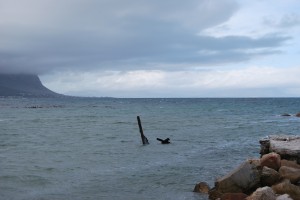 In 1992, 1600 scientists including 102 Nobel Laureates put their signature to a document titled “Warning to Humanity” which stated: “No more than one or two decades remain before the chance to avert the threats we now confront will be lost and the new prospects for humanity immeasurably diminished. A new ethic is required – a new attitude towards discharging our responsibility for caring for ourselves and for the Earth. This ethic must motivate a great movement convincing reluctant leaders and reluctant governments and reluctant peoples themselves to affect the needed changes”.
In 1992, 1600 scientists including 102 Nobel Laureates put their signature to a document titled “Warning to Humanity” which stated: “No more than one or two decades remain before the chance to avert the threats we now confront will be lost and the new prospects for humanity immeasurably diminished. A new ethic is required – a new attitude towards discharging our responsibility for caring for ourselves and for the Earth. This ethic must motivate a great movement convincing reluctant leaders and reluctant governments and reluctant peoples themselves to affect the needed changes”.
Two decades later not much has changed in the way of attitude or a new ethic from a global viewpoint. But much is changing from an ecological perspective with scientists fearing that many tipping points have already been reached. I wonder what it will take for reluctant leaders, governments and people to finally understand the big picture … and then to make the monumental changes required to reverse this darkening picture? Never before has there been this degree of responsibility for humankind. I can only hope that we are up to the challenge!
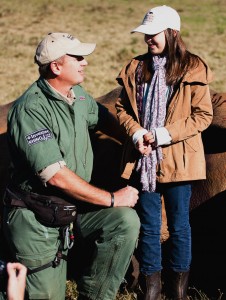
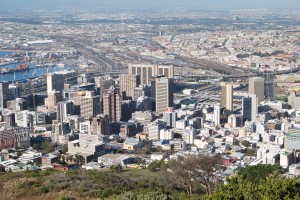 < Is this the forerunner of an ecumenopolis?[/caption]With the recent earthquakes in New Zealand and China I am reminded of the belief of Dr Ian Player (the renowned conservationist and thought-leader who wrote the Foreword for my book) that the planet would retaliate in response to humankind's disruption of natural systems and decimation of species.
I must confess that at the time we had this conversation I thought that it was somewhat of an anthropomorphic worldview as it attributed human characteristics of retribution and revenge to the planet. A decade-and-a-half later I concede that Dr Player could have a point!
With the anthroposising of the planet and our relentless march towards an ecumenopolis (a gargantuan city that stretches from north to south, east to west covering the Earth's surface) will we, in our lifetime, witness the end of the metaphorical "Long Summer", a period of planetary equilibrium that has enabled our species, homo sapiens sapiens, to prosper to the point of overproliferation? Certainly it seems that things are speeding up which, although it confirms what I felt and wrote about in “Miracles of Hope” over two decades ago, is nevertheless disquieting to say the least. We are certainly living in interesting times!!
< Is this the forerunner of an ecumenopolis?[/caption]With the recent earthquakes in New Zealand and China I am reminded of the belief of Dr Ian Player (the renowned conservationist and thought-leader who wrote the Foreword for my book) that the planet would retaliate in response to humankind's disruption of natural systems and decimation of species.
I must confess that at the time we had this conversation I thought that it was somewhat of an anthropomorphic worldview as it attributed human characteristics of retribution and revenge to the planet. A decade-and-a-half later I concede that Dr Player could have a point!
With the anthroposising of the planet and our relentless march towards an ecumenopolis (a gargantuan city that stretches from north to south, east to west covering the Earth's surface) will we, in our lifetime, witness the end of the metaphorical "Long Summer", a period of planetary equilibrium that has enabled our species, homo sapiens sapiens, to prosper to the point of overproliferation? Certainly it seems that things are speeding up which, although it confirms what I felt and wrote about in “Miracles of Hope” over two decades ago, is nevertheless disquieting to say the least. We are certainly living in interesting times!!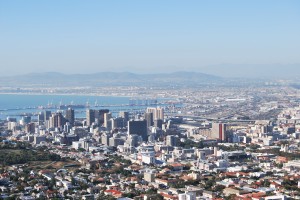 Recently < I had the opportunity to see the documentary "Planet Ocean" - an excellent documentary and really worthwhile viewing. Watching it I was struck by the degree to which some heavily industrialised cities in China, the world's manufacturing centre, have compromised basic human essentials such as air quality for economic growth and development. It brought home to me yet again the maxim by which I live and work: “If we do not create the future we want, we will have to endure the future we get” as I have to ask myself whether this toxic, polluted and dehumanised environment is one which the Chinese and other industrialised nations are intentionally creating for themselves?
Recently < I had the opportunity to see the documentary "Planet Ocean" - an excellent documentary and really worthwhile viewing. Watching it I was struck by the degree to which some heavily industrialised cities in China, the world's manufacturing centre, have compromised basic human essentials such as air quality for economic growth and development. It brought home to me yet again the maxim by which I live and work: “If we do not create the future we want, we will have to endure the future we get” as I have to ask myself whether this toxic, polluted and dehumanised environment is one which the Chinese and other industrialised nations are intentionally creating for themselves? 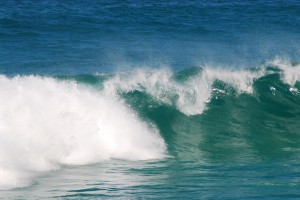 < Sparing a thought for the global ocean on World Oceans Day 2013[/caption]Ocean warrior, Paul Watson, believes: "We are now in the midst of a third world war but this time the mission is to save the planet from ourselves". As bleak as this outlook is I have to agree with it as I see our oceanic weapons of mass destruction being factory ships that drag 40km nets that siphon everything from the sea floor; ships that carry whole forests from one part of the globe to another in a glut of one-time consumption; fishing vessels that engage in shark finning that contributes in no way whatsoever to food security, but which feeds human arrogance and greed; and fishing technology that enables fishing fleets to find fish in deeper and deeper waters in our worldwide "race to the bottom".
If future generations are to live on a planet remotely like the one we are living on today, finding food in an ocean that has nourished the human race since the beginning of our time, we have no option but to win this war. It is going to be an epochal battle, the greatest in the history of our species as the stakes are literally the survival of Homo sapiens sapiens.
< Sparing a thought for the global ocean on World Oceans Day 2013[/caption]Ocean warrior, Paul Watson, believes: "We are now in the midst of a third world war but this time the mission is to save the planet from ourselves". As bleak as this outlook is I have to agree with it as I see our oceanic weapons of mass destruction being factory ships that drag 40km nets that siphon everything from the sea floor; ships that carry whole forests from one part of the globe to another in a glut of one-time consumption; fishing vessels that engage in shark finning that contributes in no way whatsoever to food security, but which feeds human arrogance and greed; and fishing technology that enables fishing fleets to find fish in deeper and deeper waters in our worldwide "race to the bottom".
If future generations are to live on a planet remotely like the one we are living on today, finding food in an ocean that has nourished the human race since the beginning of our time, we have no option but to win this war. It is going to be an epochal battle, the greatest in the history of our species as the stakes are literally the survival of Homo sapiens sapiens. 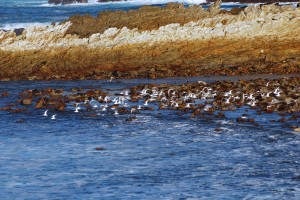 Quote from Trevor Manuel – Co–chair of the Global Ocean Commission, and Minister in the South African Presidency responsible for planning:
Quote from Trevor Manuel – Co–chair of the Global Ocean Commission, and Minister in the South African Presidency responsible for planning: